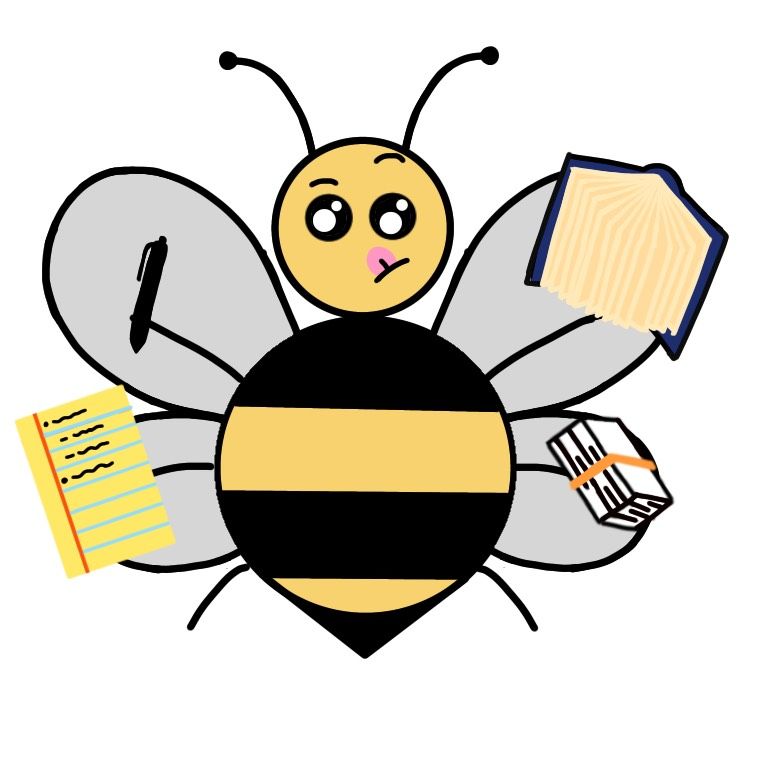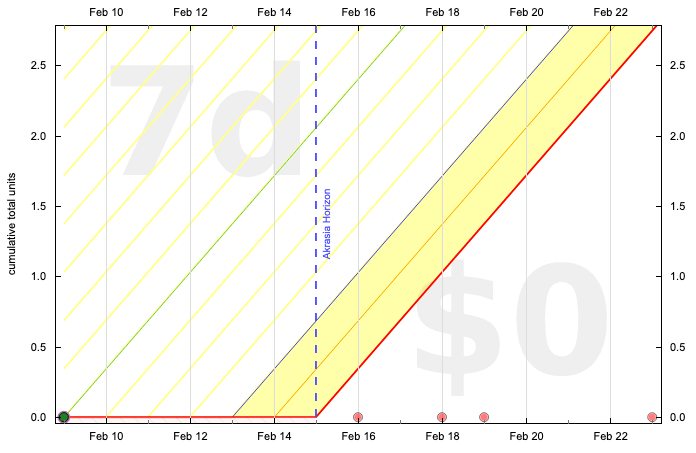
We are overdue for a blog post about using Beeminder for school and studying. In the very early days of Beeminder, we had a brilliant guest post from Gandalf Saxe when he was a wee undergrad. Now he’s an engineer at Apple, working on Siri. We’re going to go ahead and take a chunk of credit for that. His guest post here on the blog, “Study Wizardry is still worth reading. More recently, we’ve had Lawrence Evalyn’s “Beeminder, With The Power Of Reading!”. And now, the latest thoughts of our brilliant Support Czar and voracious student, Nicky!
I’ve been promising a blog post about studying for ages, because when you have someone with three degrees under their belt (number four on the way!) hanging round doing support for a site that people often use for studying, asking them for the secrets of their success sounds like a no-brainer.
I’ve been using Beeminder-like methods for studying since megalodon swam the seas. When I was a teenager, I was notorious for procrastination, but managed to set up a bet with my sister that I couldn’t finish my homework. Obviously, I won. Sorry, Simone.
When I had to write my MA dissertation, I stalled long enough on the actual writing part that I ended up betting my parents I’d have a full draft on New Year’s Day — starting from nothing on 28th December. I did it, too: my parents had to buy me a pair of giraffe pyjamas and a Jellycat plush for my collection, as I recall…
When it came to my BSc and now my MSc, I had Beeminder.
When I first tried to write this post, I tried to talk about every single Beeminder goal I ever found helpful for studying. That got really long, but it did help me pick out the one central thing that helped in every single case: having to put in the time.
So if you just want the key takeaway of this post, then my pithy one-line advice is to make a goal tracking your overall time spent studying.
But how do I decide how much time to spend?
“Make a goal tracking your overall time spent studying”
This is the tricky part! Or sometimes less tricky: in many courses I’ve done, there’s an estimate given of how much time they think you should be putting in. After extensive testing, I can reveal that they’re usually right — yes, even if you read incredibly fast (I do) or already know the subject to some extent. And it’s not like there’s a point beyond which putting in more time on a subject is useless.
So here’s an example about how I set up a goal. In October 2020, I logged into my brand-new study environment to discover that the MSc programme I’d signed up for was very very much self-paced. We had two set dates: the first assignment, and the second assignment. We were also advised that we should spend about 150 hours on the class, in total. The rest was up to us.
The first thing I focused on was that 150 hours: I could extract a pace from that, obviously, by setting the end date to the submission date for the second assignment. Then Beeminder would tell me how many hours I had to put in per day to reach that goal. Simple!


It’s easy to coast by and tell yourself that reading through things once is enough — but with 150 hours to fill, that was plenty of encouragement to do optional reading, dive deep, make extra notes, etc.
In the end, you can see from those graphs that I didn’t hit 150 hours, and did make adjustments along the way according to other commitments and re-evaluating how much time I needed to spend. I think that’s fine — the important thing is that right from the beginning I set out to put a huge chunk of time into the goals, and it paid off. (My GPA from the statistics class was a perfect 5, while my GPA from the biology class was 4.5 — both of those are easily a distinction in my university’s grading system. Thanks, Beeminder!)
Are there any other goal types you’d recommend?
It really depends on how your course is set up, but I think there’s always room for some supplementary goals that help you focus your studying. It doesn’t matter how long you spend on it if you aren’t finishing your assignments in time, or if you really can’t remember what medium to culture Candida albicans on, after all! (Sabouraud dextrose agar, if you were wondering.)
So when it comes to supplementary goals, I have two main suggestions that worked for me: flashcards and what I guess I’ll call progress evaluation, to give it a concept handle.
Flashcards:
When it comes to flashcards, I had one goal for making cards, and two for reviewing them (one per class):
- beeminder.com/shanaqui/ankicreate
- beeminder.com/shanaqui/bio101reviews
- beeminder.com/shanaqui/biostatreviews
There is an unofficial Anki extension out there which pairs with Beeminder, so I could have automated this, but I preferred the dead simple method of adding a +1 when I’d reviewed all the cards that were due that day.
Progress evaluation:
A user in support actually gave me the idea for this goal, saying that they had created a graph and then added “0” datapoints (as in datapoints with values of zero) to it in advance, as a kind of guideline. I set up a goal to finish two days before my exam, counted up the number of chunks my course was divided into, and made the end total that number. Then I got to planning out and tweaking my schedule for actually studying: I added zero-datapoints with the headings of each section to the graph, and then figured out how to arrange the dates so it was neatly spread out over time.
The zero-datapoints helped me see well in advance when my data would intersect the line (handy if you’re like me and you like to have plenty of buffer), the pre-entered datapoints (with explanatory comments like “Validity and reliability of screening and diagnostic tests”) acted as a nice checklist for making sure I got everything done, and there was something very satisfying about turning those zero datapoints into something solid and real. You can check out the end result, but it probably makes more sense with a quick mock-up of how it looked when I was just getting started:

The bottom line
For me, a simple do-more goal linked with Toggl is the starting point from which I build, every single time. I wouldn’t say you don’t need anything else, because you can bet I’ll be breaking out the flashcards goal again in a couple of months. But any other kind of goal has a risk of making you feel like you’re being really diligent when you’re just doing the bare minimum. There’s no escaping from simply having to put. in. the. time.
Here I go again.


Image credit: Faire Soule-Reeves